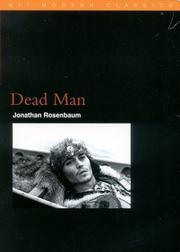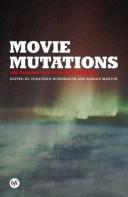| Listing 1 - 4 of 4 |
Sort by
|

ISBN: 0851703585 Year: 1993 Publisher: London British Film Institute
Abstract | Keywords | Export | Availability | Bookmark
 Loading...
Loading...Choose an application
- Reference Manager
- EndNote
- RefWorks (Direct export to RefWorks)
Jonathan Rosenbaum --- filmklassiekers --- Greed --- von Stroheim Erich --- Norris frank --- McTeague --- 791.471 VON STROHEIM --- film --- Film --- filmgeschiedenis --- Greed (Motion picture)

ISBN: 0851708064 Year: 2000 Publisher: London British Film Institute
Abstract | Keywords | Export | Availability | Bookmark
 Loading...
Loading...Choose an application
- Reference Manager
- EndNote
- RefWorks (Direct export to RefWorks)
When it was released in 1995, 'Dead Man 'puzzled many audiences and critics. Jim Jarmusch's reputation was for directing slick, hip contemporary films. And 'Dead Man' was a black-and-white Western. As time has passed, though, the number of its admirers has grown considerably. Indeed 'Dead Man,' with its dark and unconventional treatment of violence, racism and capitalism, may be Jarmusch's finest work to date. This is Jonathan Rosenbaum's view. For him, 'Dead Man 'is both a quantum leap and a logical next step in Jarmusch's career, and it's a film that speaks powerfully to present-day concerns. Starring Johnny Depp as the uprooted accountant William Blake and Gary Farmer as his enigmatic Native American companion, Nobody, and with startling cameos from Robert Mitchum, John Hurt and Iggy Pop, 'Dead Man' is by turns shocking, comic, and deeply moving. This book explores and celebrates a masterpiece of 1990s American cinema.
Jonathan Rosenbaum --- film --- filmgeschiedenis --- Jarmusch Jim --- Verenigde Staten --- westerns --- 791.471 JARMUSCH --- Dead man (Motion picture). --- Dead man (Motion picture)

ISBN: 0851709842 0851709834 Year: 2003 Publisher: London British Film Institute
Abstract | Keywords | Export | Availability | Bookmark
 Loading...
Loading...Choose an application
- Reference Manager
- EndNote
- RefWorks (Direct export to RefWorks)
Film --- Edited by Jonathan Rosenbaum and Adrian Martin --- film --- filmgeschiedenis --- Kiarostami Abbas --- Ming-liang Tsai --- Tsai Ming-liang --- Hawks Howard --- auteurtheorie --- Masumura Yasuzo --- Panahi Jafar --- globalisering --- twintigste eeuw --- eenentwintigste eeuw --- 791.43 --- Motion pictures --- Cinema --- Feature films --- Films --- Movies --- Moving-pictures --- Audio-visual materials --- Mass media --- Performing arts --- History and criticism
Book
ISBN: 9780520279735 9780520279742 9780520957947 0520279735 0520279743 0520957946 1306155657 9781306155656 Year: 2014 Publisher: Berkeley, Calif. University of California Press
Abstract | Keywords | Export | Availability | Bookmark
 Loading...
Loading...Choose an application
- Reference Manager
- EndNote
- RefWorks (Direct export to RefWorks)
In 1895, Louis Lumière supposedly said that cinema is "an invention without a future." James Naremore uses this legendary remark as a starting point for a meditation on the so-called death of cinema in the digital age, and as a way of introducing a wide-ranging series of his essays on movies past and present. These essays include discussions of authorship, adaptation, and acting; commentaries on Howard Hawks, Alfred Hitchcock, Orson Welles, Vincente Minnelli, John Huston, and Stanley Kubrick; and reviews of more recent work by non-Hollywood directors Pedro Costa, Abbas Kiarostami, Raúl Ruiz, and Apichatpong Weerasethakul. Important themes recur: the relations between modernity, modernism, and postmodernism; the changing mediascape and death of older technologies; and the need for robust critical writing in an era when print journalism is waning and the humanities are devalued. The book concludes with essays on four major American film critics: James Agee, Manny Farber, Andrew Sarris, and Jonathan Rosenbaum.
Film --- Motion pictures. --- Cinema --- Feature films --- Films --- Movies --- Moving-pictures --- Audio-visual materials --- Mass media --- Performing arts --- History and criticism --- acting. --- adaptation. --- alfred hitchcock. --- american cinema. --- andrew sarris. --- authorship. --- cinema in the digital age. --- cinema. --- death of cinema. --- digital age. --- film and television. --- film criticism. --- film. --- filmmaking. --- history of cinema. --- howard hawks. --- humanities. --- james agee. --- john huston. --- jonathan rosenbaum. --- literary studies. --- manny farber. --- mediascape. --- modernism. --- modernity and film. --- movies. --- orson welles. --- postmodernism and film. --- postmodernity. --- print journalism. --- stanley kubrick. --- technology. --- vincente minnelli.
| Listing 1 - 4 of 4 |
Sort by
|

 Search
Search Feedback
Feedback About UniCat
About UniCat  Help
Help News
News